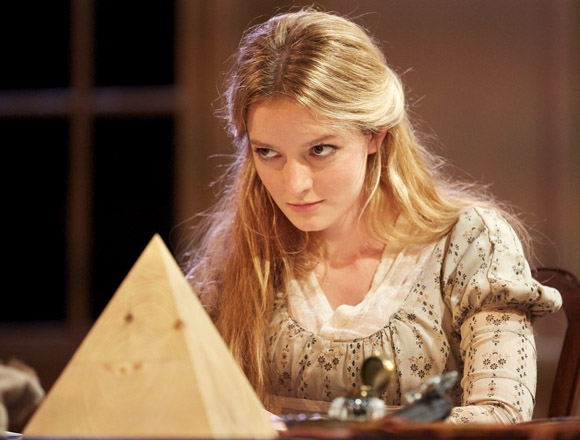C.P. Snow’s Rede lecture and subsequent book, ‘The Two Cultures’, characterized intellectual life as polarized around a split in the world of ideas, between science on the one hand and the humanities on the other. Snow thought the split harmful to society and summed it up in the idea that for a scientist to be ignorant of the works of Shakespeare is as culpable as someone in the arts being ignorant of the second law of thermodynamics. Snow himself gave literary form to the dichotomy in his book, The Masters. Stoppard’s play, a kind of pre-Osborne drawing room comedy-cum-mystery on mind-enhancing steroids, similarly looks at the world as two opposing forces.
The customary Stoppardian leaps of imagination are transmuted here into leaps between epochs and the play’s USP is the way it skips nimbly between the early nineteenth and latter twentieth centuries, drawing our attention, by way of a number of devices including speculations about rice pudding and jam, to the uni-direction of time or ‘entropy’. At various points in the play one could wish to be sitting with Brian Cox holding your hand whispering sweet explanations in your ear. Nonetheless all the boxfull of theatrical devices are there to entertain; the wordplay, irreverence for academics, subtle anachronisms and so on.
There is also the contrast between the two forms of research undertaken by Bernard Nightingale (Robert Cavanah) the Sussex University don and Valentine Coverly (Ed MacArthur), the maths graduate; that is to say between the literary and the scientific. So on the one hand, who gives a toss if Byron happened to stay the night at Sidley Park? Whereas giving due credit to Thomasina (Dakota Blue Richards), the precocious Georgian teenager who meets an early death, for her mathematical speculations, seems a laudable enterprise. On the other hand the cool mathematical projections of the future sit unfavorably with the human warmth and interest of the research of Hannah Jarvis (Flora Montgomery) whose warm sexuality and intelligence suffuses the 90’s scenes.
My impression was that the cast seemed happiest in the modern era, with some of the dialogue in the Georgian scenes coming across as a bit leaden. Entirely exempted from this reservation is Kirsty Besterman’s Lady Croom, whose comfort in the epigrammatic style of the period is a delight.
Director, Blanch McIntyre has found a good balance between the cerebral on the one hand and the material and emotional on the other. Working within the simple, but elegant box set of Jonathan Fensom (sans cyclorama) she finds enough movement to animate the tussle of ideas, which lie at the heart of the play.
This stylish English Touring Theatre production offers everything a Stoppard fan might look for, fizzing as it does with intellectual challenge and might even gain a few converts along the way. ★★★☆☆ Graham Wyles 10/02/15 at Bath
Photos by Mark Douet


